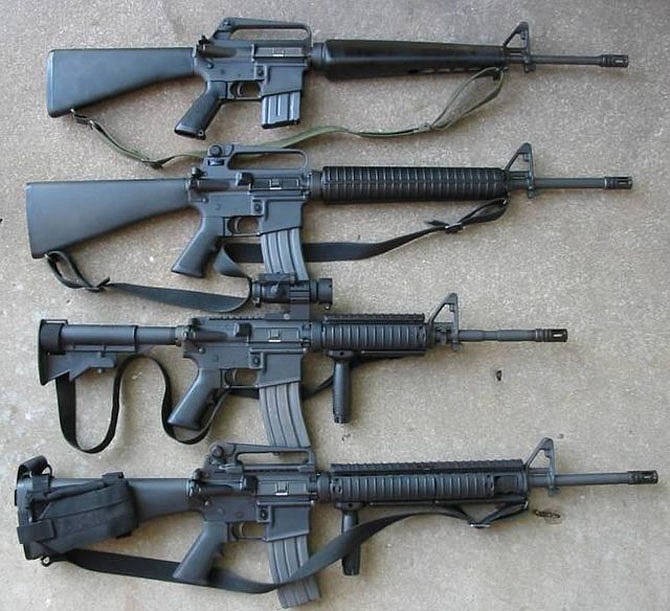Assault style weapons’ sale, carry, and age for possession remain the subject of debate in Virginia’s General Assembly
Virginia came close to banning sales of assault weapons in 2020 when the House passed a bill banning them by a narrow 51-yes to 48-no vote. In the Senate Judiciary committee that year however, three Democrats: Senators Creigh Deeds, Chap Petersen, and Scott Surovell, surprised many by voting with Republican committee members to fail to move the bill forward in the Senate. Now, four years later, neither that assault bill’s patron, former Del. Mark Levine, nor nay voter, Petersen, returned to the General Assembly. Deeds (D-11) is sponsoring his own assault weapon ban this session; and Surovell (D-34) now chairs the committee, titled Courts of Justice, which hears the assault weapon bills, and others related to firearms. Surovell also now leads the Democratic Caucus. The Deeds’ bill, SB 2, would prohibit the purchase, possession or sale of assault weapons. The bill by Sen. Adam Ebbin (D-39), SB-99 would prohibit carrying assault weapons in public. And a bill from Sen. Saddam Salim (D-37), SB 327 would expand the definition of “assault firearm” and prohibit sales or purchase to anyone under the age of 21.
On the House side, Del. Dan Helmer (D-10), who voted for the assault weapons ban in 2020, this session is the sponsor of an assault weapon ban companion bill, HB 2. That bill reported from the Public Safety committee on Jan. 19 and was referred to the Appropriations Committee. Del. Mark Sickles’ (D-17), bill HB1174, places an age restriction of 21 on purchase of assault weapons. Del. Marcus Simon (D-13), bill HB175, is the companion bill that would prohibit carrying assault weapons in public. Speakers at the bills’ Public Safety Committee hearing included faith and public safety and gun control groups, including Giffords Law, Brady Center, and Chesapeake League of Voters, in favor of the bills. Several members of the Virginia Citizens Defense League, a representative of the NRA, and shooting sports group members spoke in opposition.
As the assault weapon restriction bills successfully work their way through various committees on partisan votes, Surovell at his recent Town Hall, explained what is different about assault weapon restriction chances this session from 2020.
Surovell explained that he has always favored restriction of assault weapons, but that the wording of the 2020 bill needed much more work than could be given to it that year. He and other Senators voted to continue it for study until the following year. But House GOP opponents who controlled the House the next year refused to docket the bill in 2021. Surovell asserts that the 2020 session did pass five major firearm bills that year, among an unusually high volume of work, before they simply ran out of time.
Gun rights versus gun control issues continue to roil political activism in the Commonwealth and across the country. Assault weapons are used in a large percentage of mass shootings. A federal assault weapons law, which placed restrictions on the sale and manufacture of some semiautomatic assault weapons expired in 2004. Gun safety advocates opposed allowing the law to expire and called for reinstatement of the restrictions. In December 2012, a 20-year-old gunman killed 20 children, ages six to seven years old, and six adult staff members, at Sandy Hook Elementary School in Connecticut. Enacting gun safety measures in the wake of the massacre of small children seemed inevitable, but it didn’t happen.
A new national advocacy group, Moms Demand Action, formed after Sandy Hook with chapters in every state to call for gun reform and increased gun safety measures.
In 2022, a federal bill to renew and strengthen assault weapons law passed the House of Representatives but did not pass in the Senate. Today there is no federal law restricting the weapons. Ten states (California, Connecticut, Delaware, Hawaii, Illinois, Maryland, Massachusetts, New Jersey, New York, and Washington), and the District of Columbia, have enacted laws that ban the sale, manufacture, and transfer of assault weapons. Virginia (Va. Code Ann. §§ 18.2-287.4, 18.2-308.2:01, 18.2-308.2:2, 18.2-308.7, 18.2-308.8) enacted laws that place some additional safety requirements and regulations on assault weapons, but fall short laws enacted in the ten listed states.
Now, about three weeks into Virginia’s 2024 legislative session, a significant number of firearms-related bills, as well as the assault weapon bills, have an additional week for hearing in their originating body before the process of crossover begins for successful bills to be heard by the opposite body.

